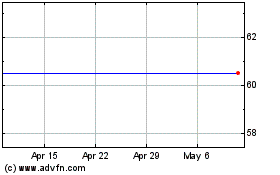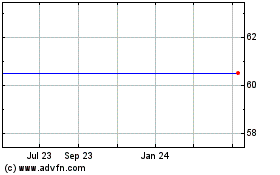Unilever Compensates Workers For Alleged Mercury Poisoning in India
March 10 2016 - 7:50AM
Dow Jones News
NEW DELHI—Unilever PLC said that it has agreed to compensate
hundreds of workers of a now-closed production facility in southern
India, ending a decade-old dispute over alleged mercury poisoning
and corporate negligence in India.
In a statement Wednesday, the Anglo-Dutch consumer giant said it
agreed to pay 591 former workers on "humanitarian
considerations."
"We have worked hard over many years to address this and find
the right solution for our former workers," Dev Bajpai, Unilever's
head of legal affairs in India, said in a joint statement with the
facility's former workers association. "We, alongside all involved,
are glad to see an outcome to this long-standing case."
Unilever didn't disclose the amount or the terms of the
settlement, but said workers had decided to drop a 2006 lawsuit
against the company in exchange.
"We are pleased with all the terms," S.A. Mahindra Babu, who led
the former workers' association, said according to the statement.
"We now consider this issue to be fully resolved and have no more
grievance against the company," he added.
Activist groups and former workers have blamed Unilever for
dumping toxic waste outside a thermometer plant in Kodaikanal, a
hill town in the southern state of Tamil Nadu. In 2001, rights
groups, led by Greenpeace International, said the facility had sold
a stockpile of crushed glass, tainted with mercury, to a scrap
dealer near the plant. Unilever acknowledged the sale had happened
and that it violated its practices. It shut down the facility in
response.
"There were strict processes in place for recycling glass scrap
with residual mercury. It was these procedures that had been
breached," the company said at the time. It, however, denied
polluting factory surroundings.
In 2006, plant workers took the company to court, alleging their
health had severely deteriorated from exposure to mercury inside
the facility. Excessive mercury exposure is known to cause nervous
breakdowns, kidney failure, and in severe cases, death. Activists
alleged more than 30 workers had died prematurely—an allegation
Unilever denied.
A court-appointed committee concluded in 2007 it found no
evidence to show workers' health had suffered. Unilever said its
own studies, as well as those conducted by several independent
bodies, found workers' health hadn't been affected. Meanwhile, a
study published by India's Ministry of Labor and Employment in 2011
alleged the exposure hadn't just hampered the lives of workers, but
also taken a toll on their newborn children. Unilever challenged
these findings.
The long-standing conflict resurfaced last year after a rap
song, inspired by Nicki Minaj's hit single Anaconda, went viral on
social media. The song, composed by a Sari-draped Indian rapper,
called for Unilever to "clean up your mess," and prompted a public
debate over what was until then being discussed in courtrooms.
Chief Executive Paul Polman responded to the outcry sparked by
the song, tweeting from his verified account that the issue called
for "facts not false emotions." He added the company was
"determined to solve" the matter.
"People power works. That's the key lesson we're drawing from
today's big announcement," Rachita Taneja of Jhatkaa.org, an
activist group that lobbied for the workers, said in a statement
Wednesday.
"The settlement is a victory of the workers and the local
campaigning efforts," Greenpeace said in a statement Wednesday.
"But there remains other unfinished business related to the
factory: the need for a thorough environmental remediation of the
site," it added.
Unilever said it was already working with local authorities and
had sought permission to carry out soil remediation around the
facility. "We have been working hard to resolve this issue, but we
are not able to commence the cleanup until we receive consent," the
company said. "We are eagerly awaiting this so we can begin work as
soon as possible."
Write to Preetika Rana at preetika.rana@wsj.com
(END) Dow Jones Newswires
March 10, 2016 07:35 ET (12:35 GMT)
Copyright (c) 2016 Dow Jones & Company, Inc.
Unilever NV (NYSE:UN)
Historical Stock Chart
From Mar 2024 to Apr 2024

Unilever NV (NYSE:UN)
Historical Stock Chart
From Apr 2023 to Apr 2024
